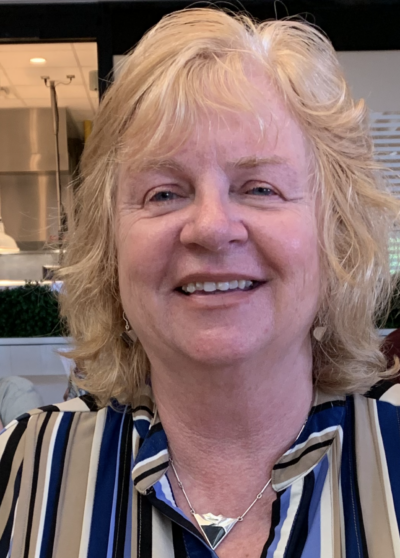Alexandra’s story is complex and underscores how important PROSE treatment is for those suffering from severe ocular surface disease. Her story outlines how PROSE treatment is more than a scleral lens – it is a co-managed treatment between her PROSE provider and her other healthcare providers.
“I’m extremely grateful PROSE exists. I don’t know if many optometrists know enough about PROSE and how the lenses can be adjusted at more angles.”
“Before PROSE, I couldn’t even read. Every 10 minutes I was putting eye drops in my eyes. I had what looked like chronic conjunctivitis,” says Alexandra Schalekamp. “My eyes felt gritty and like I had something in them all the time.”
Getting a diagnosis
Her local optometrist tried a few commercial dry eye treatments, but nothing worked to relieve the discomfort. Alexandra spent 3 years seeing doctor after doctor before finding dry eye specialist, Dr. Steven Maskin, in Tampa, Florida. Although up to 90 minutes away from her home in Orlando, she went to see him, needing answers. Dr. Maskin ordered an MRI of her lacrimal glands, which showed that her glands were “shriveled up like raisins and scarred.” His exam revealed a diagnosis, finally: ocular cicatricial pemphigoid (OCP).
“shriveled up like raisins and scarred.” His exam revealed a diagnosis, finally: ocular cicatricial pemphigoid (OCP).
Cicatricial pemphigoid is a rare chronic autoimmune subepithelial blistering disease that causes erosive lesions of the mucous membranes and skin. OCP is even rarer and can result in severe dry eye and excessive scar tissue on the conjunctiva, known as conjunctival fibrosis or conjunctival keloid. Up to 30% of patients with advanced conjunctival fibrosis become blind and the disease can be challenging to manage, often requiring systemic therapy.
“I did not want to believe it, as no one has [OCP] in my family,” Alexandra says, and the disease is genetically pre-dispositioned.
Ongoing eye care
Alexandra started a new routine to care for her eyes, next seeing a rheumatologist and beginning steroids and drug therapy. Her disease progression was unresponsive, and she had to start Intravenous Immunoglobulin (IVIG), reserved only for the most severe disease state. IVIG requires a 3-day infusion protocol, every month, and can have severe systemic complications such as anaphylaxis and renal failure.
Alexandra’s IVIG was combined with the drug rituximab, a monoclonal antibody. Because of her lowered immunity, she required regular testing to ensure she didn’t develop John Cunningham (JC) virus, also known as polyomavirus. JC is common in humans and doesn’t cause symptoms if inactive. However, if it becomes active in a person with lowered immunity, it can be devastating. Between 30% to 50% of people who develop active JC die within the first few months. Those who survive often have a lasting neurological disability. In addition to the enormous stress around managing her condition, Alexandra felt she still needed special care for her eyes.
“I was so afraid to lose my vision. I searched the internet and found Dr. Foster, an ocular immunologist in Boston, and made the trip to see him.” Dr. C. Stephen Foster is the Founder of Massachusetts Eye Research and Surgery Institution (MERSI) Ocular Immunology & Uveitis Foundation in Waltham, Massachusetts.
Dr. Foster biopsied her film conjunctiva to see if ocular rosacea was contributing. It was. He changed her medications, and she made appointments to see him twice a year. But with OCP, much can change in 6 months. She now had a constant foreign body sensation in her eyes and a dry area that hurt while blinking. Back in Orlando, Alexandra underwent IPL (intense pulsed light) treatment for her dry eyes. Her local optometrist also fit her with commercial scleral lenses but because her disease causes the conjunctiva to be irregular, they didn’t provide a good fit. At her next appointment with Dr. Foster he confirmed the fit was not adequate.
Finding PROSE treatment
During this time, Alexandra also learned about PROSE treatment through an OCP Facebook Group. “I went to BostonSight’s website and got excited as the PROSE lenses could be way more customized than others.”
While her local optometrist was not familiar with the benefits of PROSE, Dr. Foster works with BostonSight often. Alexandra had Dr. Foster’s office coordinate with BostonSight in Needham to get her a PROSE appointment. She says she immediately felt relief from PROSE.
“I was so happy!! My vision is great, and it made my life more comfortable. I can wear my PROSE lenses roughly 12 hours a day which is amazing, as the traditional scleral lenses I could only wear for 3 to 4 hours and felt pain. Anyone that is struggling with severe dry eye and vision, please do not wait.”
PROSE treatment for severe ocular surface disease
Alexandra says although OCP changed her life, she hasn’t let it ruin her life. She still must use special eye drops called PRGF (Plasma Rich Growth Factors) before applying her PROSE devices and after she takes her devices out. By applying them after she takes the devices out at night, the drops allow her to keep her eyes open for almost an hour before bed with minimal pain.
She has this advice for others seeking PROSE treatment. “It is so worth it to book five days to sit in Needham to go to the PROSE clinic,” she says. “My PROSE Provider, Dr. Alan Kwok, is very detailed and takes a lot of pride in his work. You cannot find a more dedicated place to get the best fit. The staff is very friendly and patient to teach you about the care and insertion and taking off your lenses. Invest in a visit to the PROSE clinic. You won’t regret it and wished you had done it earlier!”